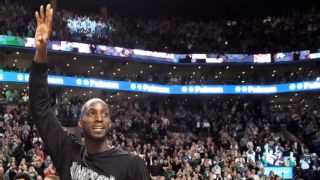|
If you think of what the NBA was before Kevin Garnett arrived, it's easy to certify the Big Ticket as the most influential player of his generation. It starts, of course, with him leading the new wave of preps-to-pros players in 1995 when he became the first high school player in 20 years to enter the draft. Kobe Bryant and Jermaine O'Neal followed the next year, and the trend was quickly established. Every subsequent draft had at least one high school player taken in the first round until the NBA put a stop to the practice in 2005. By then, Garnett had already extended his influence in other ways, most notably when the league came to a halt in 1998 in the first missed games for a work stoppage in NBA history. That lockout marked the culmination of the owners' extreme reaction to his $126 million contract with the Timberwolves. Fearful of signing players to deals that exceeded the value of their franchises, the owners held the line in negotiations until they added maximum player salaries to the collective bargaining agreement. That salary ceiling held the line at the top end, but it also paved the way for the formation of superteams in the free-agency era. With the disparity reduced between what the home team and suitors could offer, it both reduced the financial incentive for Garnett to stay with the team that drafted him and enhanced teams' salary cap wherewithal to add superstars (since an already-present superstar would occupy a smaller portion of the cap). Then, of course, Garnett's willingness to leave Minnesota and join the Boston Celtics was the start of the modern arms race in the NBA. Having two players in their prime and on their way to the Hall of Fame was no longer enough. Now it had to be three. And it wasn't just that Garnett moved -- it's that he went to the Eastern Conference. Would LeBron James have felt the need to leave Cleveland in 2010 if the Celtics of Garnett, Paul Pierce and Ray Allen had not defeated the Cavaliers in the playoffs twice in three years? Maybe LeBron would have come closer to a championship -- or won it all -- on his own and would have never felt the need to leave in the first place.  The stretch from 2007 to 2010 might not have been the best of Garnett -- I'd nominate his 2003-04 MVP season in Minnesota -- but it represented his greatest impact. It wasn't felt only in Boston, where he helped restore the franchise to glory. It was felt around the league. The preps-to-pros path that he cleared was echoed at the highest levels of hoops. Three straight Finals matchups featured high school players on both sides of the marquee: Garnett and Kobe Bryant, plus Dwight Howard. Of course, that was bookended by LeBron James in 2007 and from 2011 to the present. The owners and front-office executives didn't want the risk and unpredictability of drafting high school players. That's why they eliminated the opportunity, with the players union's compliance. It wasn't Garnett's fault that not every teenager could match his standards. But Garnett should get credit that Kobe and LeBron were able to surpass him. Maybe they would have entered the league after high school regardless (Kobe insists he'd already made up his mind before KG). Garnett's success removed doubt that they were making the right move. Both the Lakers and Cavaliers were better off for adding them as soon as they had their high school diplomas in hand. Garnett altered a decade of drafts. He changed the salary structure. He altered superstar assemblies. As Garnett exits the NBA, he leaves with LeBron James back in Cleveland as the reigning champion and with Kevin Durant joining the Golden State Warriors to form a super-superteam. Garnett is gone, and he's never been more relevant.
|

